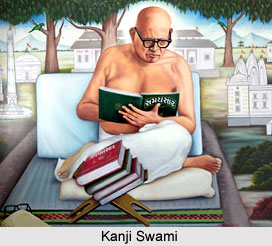 Kanji Swami Panth has the most successful Jain movement of the twentieth century. The movement was initiated by Kanji Swami. He was born in 1889 into a Sthanakvasi household in a small village in the Kathiawar region of Gujarat. He became an orphan at an early age. With time he became inclined towards the ascetic life and in 1913 he took initiation as a Sthanakvasi monk. Within a short span of time Kanji Swami became a learned and celebrated monk. He was bestowed with the title `Kohinoor of Kathiawar.` However, he was never able to accept the Swetambara Holy Scriptures, as he felt that it lacked a sense of soul. During the year 1921 the discovery of Kundakunda`s `Essence of the Philosophy` completely changed the course of Kanji Swami`s life.
Kanji Swami Panth has the most successful Jain movement of the twentieth century. The movement was initiated by Kanji Swami. He was born in 1889 into a Sthanakvasi household in a small village in the Kathiawar region of Gujarat. He became an orphan at an early age. With time he became inclined towards the ascetic life and in 1913 he took initiation as a Sthanakvasi monk. Within a short span of time Kanji Swami became a learned and celebrated monk. He was bestowed with the title `Kohinoor of Kathiawar.` However, he was never able to accept the Swetambara Holy Scriptures, as he felt that it lacked a sense of soul. During the year 1921 the discovery of Kundakunda`s `Essence of the Philosophy` completely changed the course of Kanji Swami`s life.
Ascetic Life of Kanji Swami
Kanji Swami Panth began studying other Digambara Holy Scriptures such as the writings of Todarmal and Shrimad Rajachandra. He soon realised that the Digambara Jainism was the actual true path. He spent a kind of double life for some time, nominally a Sthanakvasi monk but regarded himself as a Digambara. In 1934 finally his divine crisis came to an end. In that year during the celebration of Mahavir Jayanti in the small town of Songarh he threw away his muhpatti and declared himself to be a Digambara layman. However, Kanji Swami never became a Digambar monk. Initially the Swetambara Sthanakvasi community of Gujarat resented of his activity as it thought it to be an apostasy towards Digambar philosophy. However, with time the local Sthanakvasis became reconciled to Kanji Swami. Now about three hundred families today living at Songarh and belong to the Kanji Swami Panth claim to be of Sthanakvasi background.
Philosophy of Kanji Swami Panth
Kanji Swami Panth has many followers in India, Africa, USA and UK. The philosophies of the Panth, has given due importance to the higher level of truth (nishcaya naya) over the lower one of common life (vyavahara naya). According to Kanji Swami, the three Jewels of right faith, knowledge and practice could only function correctly on the basis of a prior experience of the soul. The different types of rites and merit-making practices of Jainism were regarded as inferior and basically irrelevant.
The Kanji Swami Panth has always been regarded as a lay movement. Even the initiated monks are not given any special status. However, Kanji Swami respected the monks as he thought them to be personifying the key tenets of Jainism. Although he stood against elaborate worship and rites he accepted the worship of images in temples of Digambara Jain tradition. Some of the idols have been consecrated by him also. He travelled to many Digambara Holy places in India. Songarh in Gujarat was the founding place of this Panth. Another leading centre founded in Jaipur attracts a large number of its devotees.
The Kanji Swami Panth with time got involved in politics of the Digambara Jains. However, its adherents kept on increasing. As the Panth emphasised on simplified procedures of rite and worship, it also became increasingly popular in the Jain community. Kanji Swami died at Mumbai in 1981. The Kanji Swami movement, has remained a lay movement without initiating pupillary succession.



















